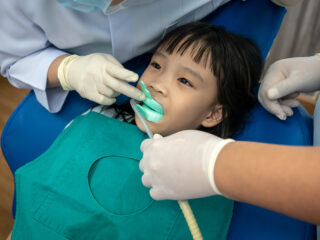
Bethesda Chevy Chase Pediatric Dentistry
4825 Bethesda Avenue
Suite #220
Bethesda, MD 20814

More Dental Health Articles
Fluoride Use for Your Children’s Dental Health

Ensuring your toddler’s dental health involves careful consideration of fluoride use, a mineral renowned for preventing tooth decay but not without potential risks. Dental fluorosis, which alters tooth enamel appearance, and the risk of toxicity are valid concerns, prompting parents to be cautious when introducing fluoride toothpaste to babies and toddlers.
The American Dental Association (ADA) recommends caregivers to use water for brushing and consult a dentist or physician before introducing fluoride toothpaste to children under 2 years. For children aged 2 to 6, a pea-sized amount is advised. ADA recommends no toothpaste, including fluoride, for babies up to one year.
For non-teething babies, a damp cloth with warm water is sufficient for cleaning. Toddlers (12 to 36 months) with erupted teeth can use a trace amount of fluoride toothpaste, but parents must be aware of the main reasons for fluoride overload in this age group.
Young children are prone to swallowing sweet, tasty toothpaste designed for them, and toddlers may struggle to spit properly, leaving more toothpaste in their mouths. The U.S. Food and Drug Administration (FDA) mandates warning labels on fluoride products for children under 6, emphasizing moderation and discouraging excessive ingestion.
Pros Of Fluoride
Strengthening Tooth Enamel: Fluoride stands out for its ability to strengthen tooth enamel, enhancing resilience against acid attacks from bacteria and sugars. This benefit significantly reduces the risk of cavities in toddlers, laying the groundwork for a lifetime of robust oral health.
Prevention of Tooth Decay: Regular fluoride treatments play a crucial role in decreasing the likelihood of cavities in children. Early exposure to fluoride creates a formidable defense against tooth decay, promoting enduring dental health.
Community Water Fluoridation: Many communities incorporate fluoride into their water supply, providing a cost-effective and widespread method of dental protection. This communal approach is particularly beneficial for children who may not have consistent access to dental care, contributing to community-wide oral health.
Safe and Effective Application: When administered correctly, fluoride is considered safe and effective. Professional application by a pediatric dentist ensures controlled and targeted exposure to fluoride, minimizing potential risks associated with improper use.
Fluoride toothpaste for toddlers is safe if used in moderation, aligning with general toothpaste guidelines. The American Academy of Pediatrics advises starting fluoridated toothpaste at the eruption of the first tooth, using a smear or grain-of-rice-sized amount for children under 3, and a pea-sized amount for most children starting at 3 years.
Supervision is crucial during brushing, with parents applying the toothpaste to ensure the correct amount. Observing the child and ensuring all teeth are covered, setting a positive example, and teaching proper spitting and rinsing habits contribute to effective and safe brushing practices.
For parents seeking fluoride alternatives, there are fluoride-free toothpaste options available. Consulting with a pediatric dentist is recommended to determine the most suitable toothpaste for a child’s unique oral health needs, whether fluoride-based or fluoride-free.
When choosing fluoride toothpaste for kids, it’s advisable to inform your dentist of your preferences, as they may have specific brand recommendations. Regardless of the toothpaste chosen, the key is to limit the amount, especially for children under 3, ensuring a balance between dental health benefits and potential risks associated with fluoride ingestion. Always prioritize your child’s dental health by consulting with your dentist to tailor a dental care routine that best suits their individual needs.
Other Articles You May Find of Interest...
- Appliances Are In Now: How To Manage TMJ Disorder
- Why The Tooth Fairy Is Very Fun – and Important!
- Let’s Smile Dental’s 7&Up Club
- Strengthening Smiles: Understanding the Importance of Splinting Periodontally Involved Teeth
- Understanding Soft Tissue Grafting: A Key To Periodontal Health
- New Solutions for Dentures and Dental Implants
- Benefits Of Immediate Dental Implants

















